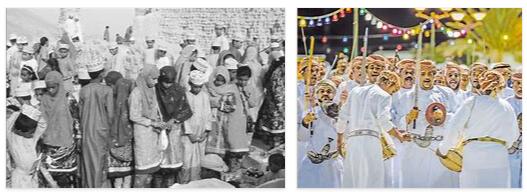HISTORY
Homeland and refuge of daring navigators and pirates since ancient times, Oman was controlled by the Portuguese from the beginning of the century. XVI until 1648 when they were driven out by the imām Nāṣir ibn-Muršid. In 1741 the dynasty of the Banū Yaruh was replaced by that of the Abu Saʽīd who conducted an expansionist policy using the title of sayyd (Gentleman). During the first half of the nineteenth century the sultanate was the most powerful state of Arabia; but it also had to face annexation attempts by neighboring countries and the danger of secession by the tribes of the interior which, at the beginning of the century. XX, managed to stand in almost absolute independence. However, even Oman (but until August 1970 the sultanate was called Muscat and Oman) ended up falling into the English orbit: the “special relations” with Great Britain, repeatedly referred to by agreements (remember the 1939 Treaty), ended in 1971, when Great Britain decided to withdraw from the Persian Gulf and the sultanate regained its full independence. Sultan Qabus ibn Saʽīd tried to break the previous cultural and economic isolation. Admitted to the League of Arab States in 1971, the sultanate, since 1972, with the support of Iranian troops, was led to counter the guerrilla of the Popular Front for the Liberation of Oman supported by the neighboring Yemen. Defeated the guerrillas (1975), Oman concluded a truce with Yemen (1976). Relations between the two countries were then normalized in 1982. After the withdrawal of the Iranian troops, Oman entered into a military and economic agreement with the US which was granted air and naval bases. The position in the field of moderate Arab countries was therefore further consolidated following the events of the Iran-Iraq war, although new diplomatic openings appeared at the time (notably the resumption of contacts with the Soviet Union): a formal expression was the strengthening of agreements with the Gulf Cooperation Council. The final pacification with Yemen therefore allowed the state to devote greater attention to industrial economic development. In the nineties, stable of the Majlis al-Shura) of sovereign nomination, the country maintained its position within the moderate alignment of the Arab world. The good relations already established with Western countries, more particularly with the United States, were strengthened following the events related to the Gulf War (1991). The sultan initiated a process of democratization by promoting a program of reforms concerning the economy and politics with, in this regard, the creation of a parliament directly elected by the citizens. In 1997 the rights were extended to women: in the subsequent elections the government chose two women to form the Advisory Council and the Sultan appointed four women to the Council of State. Also in the same year, Oman established trade and diplomatic agreements with Israel, but the process came to a halt due to opposition from the Arab League. In 2002, the sultan extended the right to vote to all citizens over the age of 21 and in the 2003 elections, which involved the entire population for the first time, two women were also elected from the 83 members of the Advisory Council. All ‘ at the beginning of 2011 there were popular demonstrations calling for political and social reforms, and the resignation of the government. In March, Sultan Qabus undertook a government reshuffle, replacing ten ministers, including those of economy, industry and the interior.
CULTURE: LITERATURE
Even in Oman, as in the rest of the countries of the Arabian Peninsula, the most developed literary production is that of poetry. Among others, the name of ʽAbd ar-Raḥmān Rafī (b.1938) stands out, who writes both traditional poems with strict stylistic rules and, like most contemporary Arab poets, modern poems with free verse, and Sheikh Abdullah bin Ali Alkhalili (1922-2000), author of six collections of poems ranging from religious themes to nationalistic issues, from epic to elegy.
According to animalerts, among the poets of the new generation emerges Sayf al-Riḥābī (b.1956), writer and journalist Sayf al-Riḥābī writes his verses in the genre of so-called prose poetry, and his poems speak of the unity of contemporary Arab culture and aspiration of Arab intellectuals to freedom. Nawras al-ğunūn (1981; The Seagull of Madness) and al-Ğabal al-ahḍar (1982; The Green Mountain). In the genre of the short story we cite Sa’ūd al-Muzaffar who publishes the collections Yawm qabla šurūq al-šams (1987; The day before sunrise) and Wa ašraqat al-šams (1987; The sun has risen).
